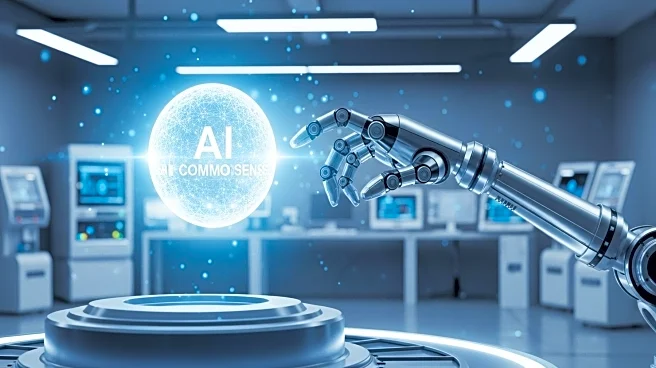What's Happening?
Nvidia is addressing the lack of 'common sense' in its AI models by incorporating human tutors to guide the learning process. The company is focusing on developing AI models that can better understand and interact with the physical world, which is crucial for applications in robotics, autonomous vehicles, and smart spaces. The AI model, named Cosmos Reason, is designed to accelerate physical AI development by inferring and reasoning through scenarios using physical common-sense knowledge. Nvidia's approach involves creating question-and-answer pairs based on video data, allowing the AI to learn through reinforcement learning, similar to how students are tested by teachers. This initiative aims to prevent potential mishaps in environments where AI interacts with physical machinery, ensuring safety and efficiency.
Why It's Important?
The development of AI models with enhanced common sense is significant for industries relying on robotics and automation. As AI systems become more integrated into factory environments and autonomous vehicles, the ability to understand and navigate the physical world safely is crucial. This advancement could lead to more reliable and efficient AI applications, reducing the risk of accidents and improving operational safety. Companies like Amazon, which employ a large number of robots alongside human workers, stand to benefit from AI models that can interact seamlessly with their surroundings. The initiative reflects a broader trend in the tech industry to improve AI's practical capabilities, potentially transforming how businesses operate and interact with technology.
What's Next?
Nvidia's continued development of AI models with enhanced reasoning capabilities may lead to further advancements in robotics and automation. As the AI models improve, they could be deployed in more complex environments, potentially revolutionizing industries such as manufacturing, logistics, and transportation. Stakeholders in these sectors may need to adapt to the integration of more sophisticated AI systems, which could change workforce dynamics and operational strategies. Additionally, Nvidia's approach may inspire other tech companies to invest in similar AI development projects, fostering innovation and competition in the field.
Beyond the Headlines
The ethical implications of AI models with improved common sense are worth considering. As AI systems become more autonomous, questions about accountability and decision-making arise. Ensuring that AI models make ethical choices in real-world scenarios is crucial to prevent unintended consequences. Moreover, the cultural impact of AI systems that can reason and interact with humans may influence societal perceptions of technology, potentially leading to increased acceptance or skepticism. Long-term shifts in how AI is perceived and utilized could emerge as these models become more prevalent.









